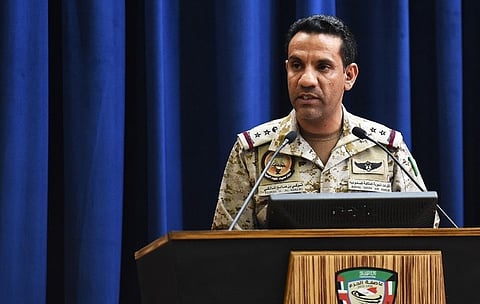

The Arab Coalition revealed on Sunday evidence proving the involvement of Lebanon's Hezbollah militia in Yemen; and using the Sana'a airport to target Saudi Arabia.
The Coalition published pictures of Hezbollah members training the Houthi militia to launch explosive-laden drones.
Coalition's spokesman Brig. Gen. Turki Al-Maliki said in a press conference that the war in Yemen is an ideological, social, and sectarian war; as the case is in Lebanon, where it adopted the sectarian ideology from Iran. "The Houthis do not have the ability to make the decision to be part of the political solution in Yemen."
Al-Maliki showed evidence of the Iranian-backed Hezbollah militia's control of the Houthis. He also said that the Iranian regime sponsors destruction and devastation in the region.
He stressed that the Coalition supports all international and political efforts; led by the United Nations to resolve the Yemeni crisis.
"The Houthi militias are not seeking peace, as Saudi Arabia presented an initiative to solve the problems; but the Houthis still insist on rejecting all the efforts to resolve the crisis," Al-Maliki said.
He added that the well-established objectives of the "Decisive Storm" operations are clear to all Yemenis and the international community; noting that the "Restoration Hope" "Decisive Storm" operations have begun at a request from the Yemeni President.
At the conference, al-Maliki presented the evidence of the Iranian-backed Hezbollah militia's control on the Houthis, as he said that the Iranian regime sponsors destruction and devastation in the region.
He added that Iran feeds sectarian ideology in Yemen, Iraq, Syria and Lebanon; where it founded Hezbollah and transmitted its ideology to Arab countries for destruction.
Al-Maliki described Hezbollah as a cancer in Lebanon, and affecting the Lebanese in the first place, while adding that the devastation extended to the whole world reaching Australia, Latin America, Europe and Africa; pointing out that the countries in the region have suffered from Iranian interference through its militias.
He also said that they were aware that the Iranian ambassador Hassan Erlo was leading the military operations in Yemen; where the coalition reviewed during the conference, pictures and footages over the involvement of Iranian elements in the military use of Sana'a International Airport.
Al-Maliki said that the coalition repelled the failed Houthi attempts to target Saudi Arabia, where he said that the Houthi militia had fired 430 ballistic missiles towards Saudi Arabia, 851 booby-trapped drones and 100 explosive-laden boats.
He added that the coalition's efforts have contributed to securing navigation in the Red Sea, where the Houthi militia has threatened maritime navigation with more than 247 naval mines.
The Houthis have taken civilian neighborhoods as a workshops to manufacture missiles, while they have taken Sanaa airport as a site for launching ballistic missiles, indicating that the Houthi militia used the Sanaa airport file as a pressure card to the United Nations.
The Houthi militia continues to use civilians as human shields, he said while pointing out that the coalition is committed to protect the civilians in Marib during operations and aims to restore security and stability in Yemen, in addition to focusing its operations on not affecting the operational capacity of Sanaa Airport.
"We will lift off the immunity from any civilian used by the Houthis to launch attacks", Al-Maliki said, noting that "The terrorist Hezbollah bears the responsibilitys for targeting civilians in Saudi Arabia and Yemen".
Al-Maliki revealed the death statistics that resulted from the deliberate targeting of civilians by the Houthis; where Saudi Arabia had the highest death rate with a total of 59 dead, 34 men, 8 women and 17 children.
Yemen followed the Kingdom with the second highest number of deaths caused by the Houthis, as 11 men, 3 women and 6 children died; while India reached the total number of deaths with 14 male deaths, then Pakistan with 9 deaths, including a child, Bangladesh with 8 deaths, including a child, and Egypt with 4 deaths.
Additionally, one person was killed each in Nepal, the Philippines, Sudan and Syria
Al-Maliki said that the coalition knows that a political solution in Yemen is the best solution; and in 2019 we reached de-escalation zones; but the Houthi militia took advantage of the de-escalation agreement and moved its forces on several fronts and continued to escalate, especially after being removed from the terrorist organizations list.
He confirmed that they monitor the movements of the Houthi militia around the clock; while saying that the militia's attempt to control Marib threatens 3 million Yemenis.
Al-Maliki also denied the Houthi militia's talk about the siege of Hodeidah, saying that it was incorrect
"The Houthi militia misinterpreted our strategic patience" Al-Maliki said; while conforming "We have the ability to respond to the Houthi militia's futility; but we are dealing with patience and wisdom."
Al-Maliki warned the Houthis for the last time; saying "We forgive and do not forget, and if we get angry, we will hurt.". "Civilians in Saudi Arabia are a red line, and we know the whereabouts of the Houthi leaders" he said.
Al-Maliki confirmed that there is a conflict of interest within the Houthi militia.
The Saudi initiative to solve the Yemen crisis is still on the table; indicating that more than 30,000 Houthis have been killed since the beginning of the year, he said
